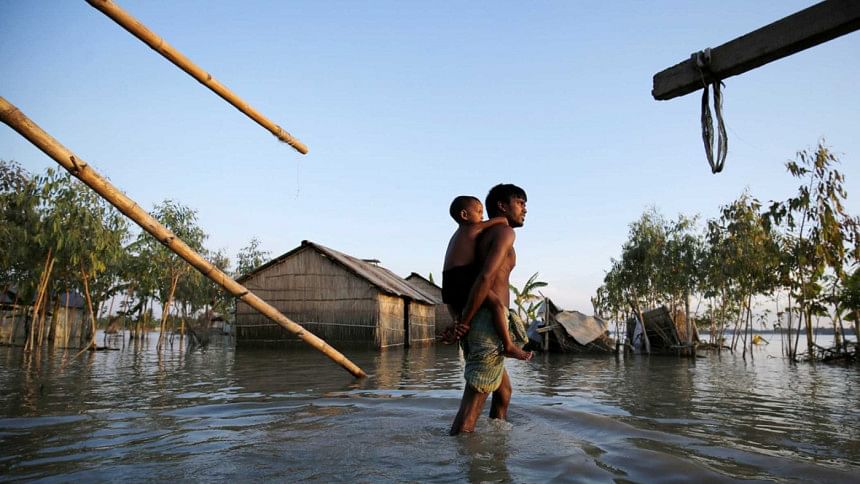Human rights are scrambling to catch up to climate change

For my Masters dissertation a few years ago, I decided to focus on the linkages between climate change and human rights, especially as they pertain to renewable energy transitions. It made sense logically. The climate crisis has been widely acknowledged as the most pressing human rights concern of our time by the UN Secretary General. The adverse effects of a changing climate were already being felt on people's rights and it would only continue to get worse as climate-induced migration increased. Being a law student, I looked at the international legal frameworks surrounding climate as well as the international human rights regime. For all the possible synergies and connections, there was little in place. But more importantly, what did exist was shockingly and woefully underdeveloped.
As far as direct linkages went, there were a few instances worth mentioning. The first acknowledgement of human rights and climate change being interconnected was found in the Male Declaration on the Human Dimension of Climate Change in 2007, adopted by the Small Island Developing States (SIDS). The following year, the Human Rights Council adopted its first resolution on climate change. By COP16 in Cancun, the official text of the conference's decision included the provision that, "Parties should, in all climate change related actions, fully respect human rights." In 2012, they appointed an Independent Expert, before converting the post into that of the Special Rapporteur on Human Rights and the Environment in 2015.
The brilliant work of the then Special Rapporteur, Professor John Knox—whose writing delved into the existing issues of why the human rights regime was as yet unprepared to obligate climate action to prevent the mass violation of human rights due to climate change—remains seminal for establishing the linkages between the human rights and climate frameworks. The inclusion of the phrase "human rights" in the preamble of the Paris Agreement was widely heralded, but more cynical perspectives might point out that this was a failure rather than a success for not being able to place human rights more centrally in what remains the seminal document on climate action.
Knox wrote extensively on the difficulties of using the existing legal and conceptual framework to hold emitters responsible. The first and foremost problem with jurisprudence, from a human rights angle, was assigning responsibilities, especially due to the transboundary nature of emissions. Emissions historically caused by European countries could lead to sea level rise in Bangladesh and cause mass damage to lives and livelihoods a world away. Proving responsibility for their specific emissions in a court would be impossible.
The standard for invoking a country's responsibility under extraterritorial obligations is very stringent and relies on establishing effective control. As Knox wrote, "If aerial bombardment does not give States effective control of the places affected, it seems unlikely that such control would result from the less immediate and drastic measure of allowing greenhouse gases to cross international borders." This is without speaking of the long-standing lack of enforcement issues that plague the international human rights regime.
However, none of this should discourage human rights laws from being innovative or adaptive in dealing with the challenges of climate change. While law is by nature often reactive—that is, a wrongdoing must occur before those responsible can be punished—human rights laws are often proactive and impose positive obligations on states. Human rights obligations are generally three-pronged: with a duty of the state to protect, respect and fulfil. This means the state must respect human rights itself, protect citizens from violations by other parties and fulfil the basic facilities for the unhindered enjoyment of human rights. The last requires positive steps from a state.
Many of the economic, social and cultural rights already prescribe positive obligations on states to take steps to attain standards for health, housing, food security, etc. Thus, when presented with the threat of climate change and the potential human rights violations that may come about, the state has a human rights obligation to take positive steps to prepare their populations accordingly; they must respect human rights themselves in the climate actions and policies they pursue, and diligently regulate other actors who are contributing to the exacerbation of the climate crisis. Precautionary action, unlike punitive action, relating to environmental and climatic destruction is actually well-established in human rights jurisprudence. To make the existing framework functional for the pursuit of climate justice, it becomes less important to ask whether climate change will violate human rights laws, and more important to ask how states will fulfil their obligation to protect human rights from the adverse effects of climate change.
There remains a disconnect between those working on human rights and those working on environmental and climate justice, although their paths are increasingly intertwined and their subjects increasingly inextricable. Many in the human rights space remain uninformed and unaware of how best to engage what could very well be the greatest human rights challenge of our time. There have been some positive developments—such as the establishment of a new Special Rapporteur on Human Rights and Climate Change last year—but much remains to be done to empower the nexus of these issues. There can be no climate justice without states respecting, protecting and fulfilling their human rights obligations.
Bareesh Chowdhury works at the Bangladesh Environmental Lawyers Association. His Twitter handle is @brshhc

 For all latest news, follow The Daily Star's Google News channel.
For all latest news, follow The Daily Star's Google News channel. 



Comments